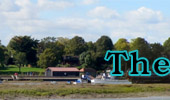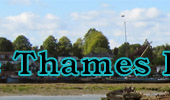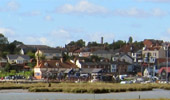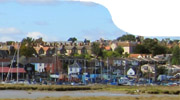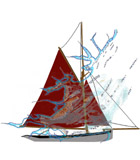
|
 |
| |
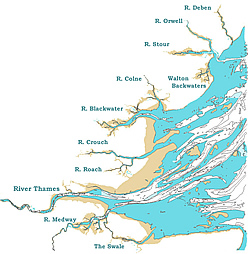
|
|
The Estuary of the River Thames is not a clearly defined entity, but make no mistake - where the salty waters of the North Sea are sweetened by the tide with the waters of the River Thames and its tributaries, there will always be a harbour for fishermen, sailors, yachtsmen and their boats. Smack, Bawley and the Thames Barge worked on the waters of the Crouch, Roach, Blackwater, Colne, Stour, Orwell, Deben, Medway and the Swale and brought commerce and trade and with it riches to the shores of the estuary.
In addition, the farmers are working the land, the very rich soil of the marshes behind the sea walls, kept humid all year round by the closeness to the many rivers, streams and tidal creeks. For many centuries agriculture has been another mainstay of the economies of Essex, Suffolk and Kent. |
|
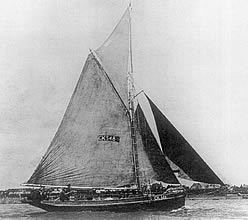 |
| |
|
|
|
|
„Come, come ..., let us get afloat. Time and tide wait for no man.“ [Scott Nigel III. 1822]
|
| click on one of these: |
|
and you might find |
 |
 my travel journal and quotations from other sources my travel journal and quotations from other sources |
| |
|
 |
 local boats, harbours, sailing culture and traditions local boats, harbours, sailing culture and traditions |
| |
|
 |
 details in geography, plants and the animal kingdom details in geography, plants and the animal kingdom |
|
|
|
 previous cultures - aural, pictorial and written history previous cultures - aural, pictorial and written history |
| |
|
 |
 the authors, their books and other publications the authors, their books and other publications |
| |
|
 |
 drawings and photographs of various artists drawings and photographs of various artists |
|
„The Sea-reach of the Thames stretched before us like the beginning of an interminable waterway. In the offing the sea and the sky were welded together without a joint and in the luminous space the tanned sails of the barges drifting up with the tide seemed to stand still in red clusters of canvas, sharply peaked with gleams of varnished sprits. A haze rested on the low shores that ran out to sea in vanishing flatness. The air was dark above Gravesend, and farther back still seemed condensed into a mournful gloom brooding motionless over the biggest, and the greatest, town on earth. (…)
„The day was ending in a serenity of still and exquisite brilliance. The water shone pacifically, the sky without a speck was a benign immensity of unstained light, the very mist on the Essex marshes was like a gauzy and radiant fabric hung from the wooded rises inland and draping the low shores in diaphanous folds. Only the gloom to the west brooding over the upper reaches became more somber every minute as if angered by the approach of the sun.
And at last in its curved and imperceptible fall the sun sank low, and from glowing white changed to a dull red without rays and without heat, as if about to go out suddenly, stricken to death by the touch of that gloom brooding over a crowd of men.
Forthwith a change came over the waters, and the serenity became less brilliant but more profound. The old river in its broad reach rested unruffled at the decline of day after ages of good service done to the race that peopled its banks, spread out in the tranquil dignity of a waterway leading to the uttermost ends of the earth. We looked at the venerable stream not in the vivid flush of a short day that comes and departs for ever but in the august light of abiding memories. And indeed nothing is easier for a man who has, as the phrase goes, "followed the sea" with reverence and affection, than to evoke the great spirit of the past upon the lower reaches of the Thames. The tidal current runs to and fro in its unceasing service crowded with memories of men and ships it has borne to the rest of home or to the battles of the sea. (…)
What greatness had not floated on the ebb of that river into the mystery of an unknown earth? . . . The dreams of men, the seed of commonwealths, the germs of empires.
The sun set; the dusk fell on the stream and lights began to appear along the shore. The Chapman lighthouse, a three-legged thing erect on a mud-flat, shone strongly. Lights of ships moved in the fairway - a great stir of lights going up and going down. And farther west on the upper reaches the place of the monstrous town was still marked ominously on the sky, a brooding gloom in sunshine, a lurid glare under the stars. (…)
„Flames glided on the river, small green flames, red flames, white flames, pursuing, overtaking, joining, crossing each other – then separating slowly or hastily. The traffic of the great city went on in the deepening night upon the sleepless river.“ (…) [Joseph Conrad „The Heart of Darkness“, 1899] [Joseph Conrad „The Heart of Darkness“, 1899]
If you want to be in the know about your user statistic and those of the other users of this site, click on this link to the webanalysis, log in under the user name "I_m" and the password "informed" and you'll be surprised.
top | home | logbook | photos | sources | maps | links
© Jan Holthusen 2012 | Webmaster
|
|

